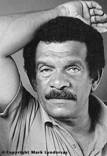Derek
Walcott
Source: http://www.english.emory.edu/Bahri/Walcott.html
A
Far Cry From
A wind is ruffling the tawny pelt
Of
Batten upon the bloodstreams of the veldt.
Corpses are scattered through a paradise.
Only the worm, colonel of carrion, cries:
"Waste no compassion on these separate
dead!"
Statistics justify and scholars seize
The salients of colonial policy.
What is that to the white child hacked in
bed?
To savages, expendable as Jews?
Threshed out by beaters, the long rushes
break
In a white dust of ibises whose cries
Have wheeled since civilizations dawn
>From the parched river or beast-teeming
plain.
The violence of beast on beast is read
As natural law, but upright man
Seeks his divinity by inflicting pain.
Delirious as these worried beasts, his wars
Dance to the tightened carcass of a drum,
While he calls courage still that native
dread
Of the white peace contracted by the dead.
Again brutish necessity wipes its hands
Upon the napkin of a dirty cause, again
A waste of our compassion, as with
The gorilla wrestles with the superman.
I who am poisoned with the blood of both,
Where shall I turn, divided to the vein?
I who have cursed
The drunken officer of British rule, how
choose
Between this
Betray them both, or give back what they
give?
How can I face such slaughter and be cool?
How can I turn from
Source: http://www.poetryconnection.net/poets/Derek_Walcott/7712
In
this paper, we are going to deal with Derek Walcott, a brilliant and an awarded
poet and moreover, a person who belongs to two cultures.
Thus,
to understand better the posture that this author defends on many of his works
and his worries about different cultures and languages, it is necessary to
mention that “Walcott was born on the
island of St. Lucia, and he is the descendent of two white grandfathers and two
black grandmothers” (Patrick Bixby).
Despite
the fact that he writes in English, the language of the colonizers, he is
defending the culture of colonised countries such as Caribbean and Africa and
also, its people, who since ancient years have suffered from lot of types of
discrimination and violence, such as racism, slavery, wars…
According
to “Patrick Bixby”, “Walcott’s art arises
from this schizophrenic situation, from a struggle between two cultural
heritages, which he has harnessed to create a unique “creolized” style. While
English and American critics often have been ambivalent about his use of the
Western literary tradition, Walcott has drawn criticism from Caribbean
commentators, who accuse him of neglecting native forms in favour of techniques
derived from his colonial oppressor”. That´s why, in the poem, he expresses
his torment; “I who am poisoned with the
blood of both, where shall turn, divided to the vein? How choose between this
In
“A far Cry from Africa” we can find a strong description of a massacre which
took place in
To
begin with, the title “A far Cry from Africa”, includes a criticism, the use of
“far”, it means that Africa is a place which is so far from England, that it is
true, and that´s why English people and other countries do not worry so much
about some events that are happening in Africa, in other words, these events
are not so important and relevant because of the long distance.
In
this poem we can see some consequences of an English attack. The first stanza
describes a terrible image; “corpses are
scattered through a paradise” (line 4) and the worms are going to eat them
(line 5). Walcott uses this description in that strong way to ask the reader
freely what this fact means to children who live in
In
the second stanza, this author names this fact “a brutish necessity of a dirty cause” (lines 22 - 23). And in line
25, “the gorilla wrestles with the
superman”, here Walcott stated ironically that African people, “the savages
(gorilla)” (line 10) are fighting with “high qualified British people”, the
heroes (superman, line 25). Surprisingly, in line 26, he admits that he belongs
to both cultures, “I who am poisoned with
the blood of both”. However he declares that he is incapable of choosing
only one culture, only one identity, because if he did this, he would be
betraying both cultures.
“A
far Cry from Africa” is a powerful poem that shows really the oppression of
Moreover,
the second stanza has a moving tone and a personal implication. Here the author
talks in the first person “I who am”
(line 26) and expresses his concerns about cultural heritage. Furthermore, he
asks himself and also the reader which posture or culture he should choose. In
fact, he shows his insecurity and tries to be understood about this fact, why
he is writing in English, the colonizers´ language; “how choose between this
As
far as I am concerned, I have been deeply moved while I have been reading it,
imaging all those corpses scattered, which could be people I love and which
have been brutally assassinated. Nobody should be killed only for a question of
imperialism, for political motives.
Furthermore,
I think that the fact of many countries being oppressed by other countries is
cruel and unfair. In fact, all countries should try to help each other and not
fight between them. In my opinion, there should be interesting to organise a
cultural interaction between all different cultures of the world, so I think
that everybody could understand all different beliefs and behaviours, and
specially, respect all of them. Because the fact is that English culture is as
important and rich as African culture.
BIBLIOGRAPHY
v
Patrick Bixby, “Adorno”; “Derek Walcott”. Spring
2000. 20 March 2006 (I
consulted it). http://www.english.emory.edu/Bahri/Walcott.html
|
Reading module 08: Derek Walcott |
|
Academic year 2006 (May 2006)
© a.r.e.a./Dr.Vicente Forés López
© Ana Mª Pardillos Murillo
Universitat de València Press
mailto:aparmu@alumni.uv.es
